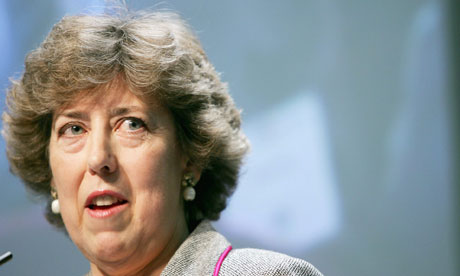Former MI5 Chief Eliza Manningham-Buller recently testified to the Chilcot Inquiry about her belief that Saddam was not a threat
On July 20, 2010 the former head of England’s domestic intelligence service the MI5, Eliza Manningham-Buller, testified to the Chilcot Inquiry that is looking into the decision to invade Iraq. As part of her appearance the Inquiry declassified a March 22, 2002 memo that she wrote to John Gieve, the permanent secretary at the Home Office that detailed her beliefs that Iraq was not a threat at that time.
Manningham-Buller wrote that Iraq was not involved in any recent terrorism against the West or tied to Al Qaeda. MI5 had not found any evidence connecting Iraq to anti-Western terrorist activity since it planned to attack ex-President Bush in Kuwait in 1993. There was also no evidence that it had a role in 9/11. While there were reports that Baghdad and Al Qaeda had met and discussed weapons of mass destruction (WMD), there was no convincing intelligence that the two had decided to cooperate or that Baghdad had provided the Islamists with WMD.
The MI5 chief went on to say that Iraq was unlikely to use WMD unless Saddam felt that he would be deposed. The last time Baghdad had resorted to large-scale deployment of WMD was against the Kurds in 1998. Since then it had only used them for assassinations against Iraqi dissidents and exiles. There was no evidence that it was planning on using WMD for mass casualty attacks, or that it was even considering terrorism. Manningham-Buller felt that increased tensions with the U.S. and England or even a limited strike against Iraq using cruise missiles would not lead Saddam to use chemical or biological weapons. She felt that only if Saddam’s rule was threatened would he use WMD, and then deploy them in conventional weapons and strike neighboring countries as he did during the Gulf War. The intelligence head went on to warn that as rhetoric heated up between Washington, London, and Baghdad, there would be increased stories of Iraq planning on using WMD or terrorism, as this happened in the 1990s.
The 2002 MI5 memo reflected the general consensus of British intelligence at that time, as well as the foreign service. A March 8, 2002 options paper by the Overseas and Defense Secretariat said that while Iraq was a destabilizing force in the Middle East it was no larger a threat than it had been before, and its WMD programs were continuing but limited. It also found no evidence that Iraq was involved in any recent acts of terrorism, and that meant there was no legal basis for war based upon self-defense or combating terrorism. A March 25, 2002 letter by England’s Foreign Secretary Jack Straw to Prime Minister Tony Blair said much of the same thing about how Iraq was not an imminent threat, and added that Iraq was not connected to either Al Qaeda or 9/11. Finally, in October 2002 British intelligence officials told the Guardian newspaper that they believed that the United States was using unsubstantiated claims to tie Iraq to Al Qaeda.
What these reports show is that Tony Blair’s decision to invade Iraq closely followed President Bush’s. Both felt that Saddam Hussein was a nagging threat since the Gulf War, and 9/11 provided them the opportunity to take care of that unfinished business. As Michael Mazarr of the U.S. Naval War College wrote in an article for Foreign Policy Analysis in 2007, policy makers fell back on what they knew, Iraq, rather than what they didn’t, Al Qaeda, after the September 11 attack. It was the beliefs of Blair and Bush that led to war, not what intelligence agencies had to say about Iraq’s connections to Al Qaeda, terrorists, or whether it was going to provide them with WMD.
SOURCES
Manningham-Buller, E.L., “IRAQ: POSSIBLE TERRORIST RESPONSE TO A US ATTACK,” MI5, 3/22/02
Mazarr, Michael, “The Iraq War and Agenda Setting,” Foreign Policy Analysis, January 2007
Norton-Taylor, Richard, “Iraq inquiry: Eliza Manningham-Buller’s devastating testimony,” Guardian, 7/20/10
- “UK spies reject al-Qaida link,” Guardian, 10/10/02
Overseas and Defense Secretariat, “Iraq: Options Paper,” 3/8/02
Straw, Jack, “Crawford/Iraq,” Foreign and Commonwealth Office, 3/25/02





3 comments:
Joel, by playing cat-and-mouse games with weapons-inspectors, was not Saddam violating the conditional armistice of the First Gulf War, a war that he started? That could have been used as a pretext for self-defence, right?
Aymenn,
In the 1990s Saddam never came clean about his programs because he didn't want anyone to know how far he'd gotten, and he was afraid of Iran, and wanted to maintain the image that he still had WMD to deter Tehran even though he destroyed everything.
In the 2000s he actually allowed more access to inspectors than ever before and tried to open up in stages, but the U.S. didn't care. The inspections were simply a mechanism to justify the war no matter what was turned up. The White House spokesman Ari Fleisher for example said if the inspectors found anything Iraq was guilty, and if nothing showed up Iraq was still guilty because it proved they were hiding WMD.
The justification for the war was that Iraq had not complied with the series of U.N. resolutions that had been passed since the 1990s about having to fully declare its weapons programs.
The inspections were simply a mechanism to justify the war no matter what was turned up. The White House spokesman Ari Fleisher for example said if the inspectors found anything Iraq was guilty, and if nothing showed up Iraq was still guilty
You are exactly right. So why then do you support these idiots
Post a Comment